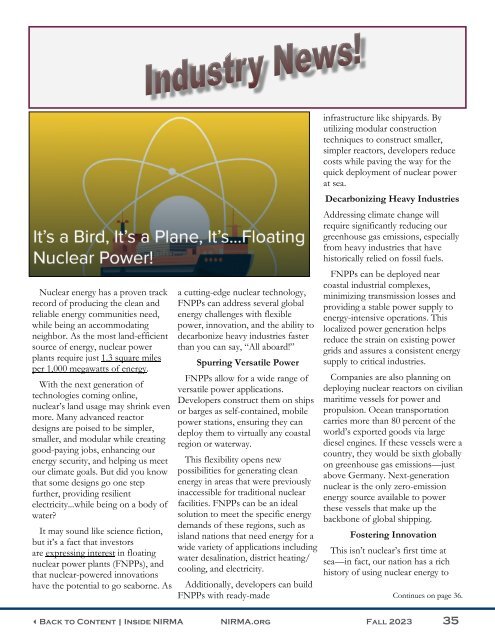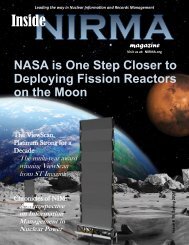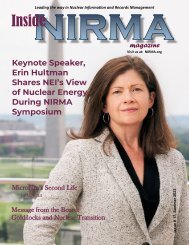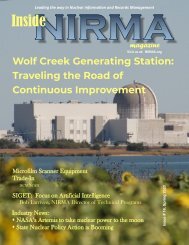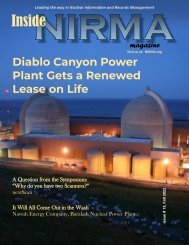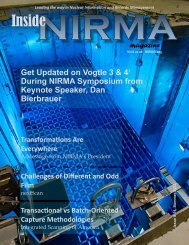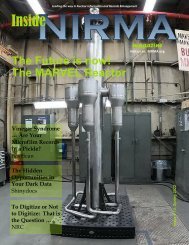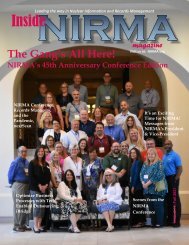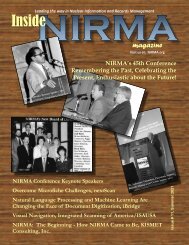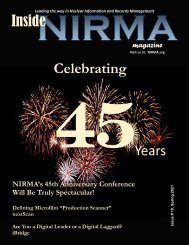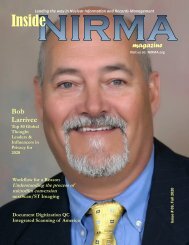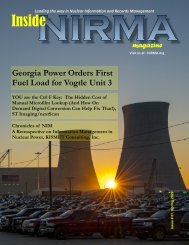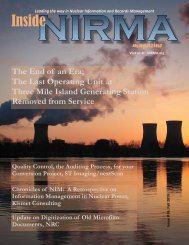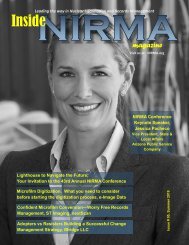Fall Inside NIRMA Issue
You also want an ePaper? Increase the reach of your titles
YUMPU automatically turns print PDFs into web optimized ePapers that Google loves.
Nuclear energy has a proven track<br />
record of producing the clean and<br />
reliable energy communities need,<br />
while being an accommodating<br />
neighbor. As the most land-efficient<br />
source of energy, nuclear power<br />
plants require just 1.3 square miles<br />
per 1,000 megawatts of energy.<br />
With the next generation of<br />
technologies coming online,<br />
nuclear’s land usage may shrink even<br />
more. Many advanced reactor<br />
designs are poised to be simpler,<br />
smaller, and modular while creating<br />
good-paying jobs, enhancing our<br />
energy security, and helping us meet<br />
our climate goals. But did you know<br />
that some designs go one step<br />
further, providing resilient<br />
electricity...while being on a body of<br />
water?<br />
It may sound like science fiction,<br />
but it’s a fact that investors<br />
are expressing interest in floating<br />
nuclear power plants (FNPPs), and<br />
that nuclear-powered innovations<br />
have the potential to go seaborne. As<br />
a cutting-edge nuclear technology,<br />
FNPPs can address several global<br />
energy challenges with flexible<br />
power, innovation, and the ability to<br />
decarbonize heavy industries faster<br />
than you can say, “All aboard!”<br />
Spurring Versatile Power<br />
FNPPs allow for a wide range of<br />
versatile power applications.<br />
Developers construct them on ships<br />
or barges as self-contained, mobile<br />
power stations, ensuring they can<br />
deploy them to virtually any coastal<br />
region or waterway.<br />
This flexibility opens new<br />
possibilities for generating clean<br />
energy in areas that were previously<br />
inaccessible for traditional nuclear<br />
facilities. FNPPs can be an ideal<br />
solution to meet the specific energy<br />
demands of these regions, such as<br />
island nations that need energy for a<br />
wide variety of applications including<br />
water desalination, district heating/<br />
cooling, and electricity.<br />
Additionally, developers can build<br />
FNPPs with ready-made<br />
infrastructure like shipyards. By<br />
utilizing modular construction<br />
techniques to construct smaller,<br />
simpler reactors, developers reduce<br />
costs while paving the way for the<br />
quick deployment of nuclear power<br />
at sea.<br />
Decarbonizing Heavy Industries<br />
Addressing climate change will<br />
require significantly reducing our<br />
greenhouse gas emissions, especially<br />
from heavy industries that have<br />
historically relied on fossil fuels.<br />
FNPPs can be deployed near<br />
coastal industrial complexes,<br />
minimizing transmission losses and<br />
providing a stable power supply to<br />
energy-intensive operations. This<br />
localized power generation helps<br />
reduce the strain on existing power<br />
grids and assures a consistent energy<br />
supply to critical industries.<br />
Companies are also planning on<br />
deploying nuclear reactors on civilian<br />
maritime vessels for power and<br />
propulsion. Ocean transportation<br />
carries more than 80 percent of the<br />
world’s exported goods via large<br />
diesel engines. If these vessels were a<br />
country, they would be sixth globally<br />
on greenhouse gas emissions—just<br />
above Germany. Next-generation<br />
nuclear is the only zero-emission<br />
energy source available to power<br />
these vessels that make up the<br />
backbone of global shipping.<br />
Fostering Innovation<br />
This isn’t nuclear’s first time at<br />
sea—in fact, our nation has a rich<br />
history of using nuclear energy to<br />
Continues on page 36.<br />
Back to Content | <strong>Inside</strong> <strong>NIRMA</strong> <strong>NIRMA</strong>.org <strong>Fall</strong> 2023 35


